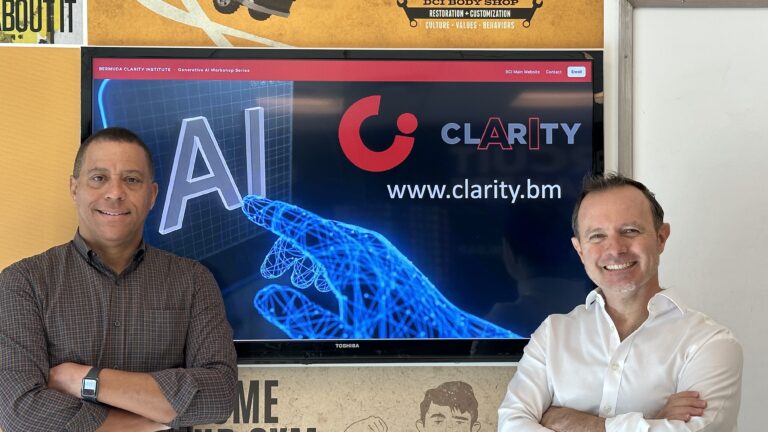In photo: Aaron Smith, left, with Stuart Lacey of the Bermuda Clarity Institute (Photograph supplied)
“Game changer” may be an overused phrase these days, but in the case of Generative Artificial Intelligence and its potential to transform business, it is an undeniably apt description.
Global management consultant Accenture says GenAI portends “likely the most significant change to work since the agricultural and industrial revolutions”. It promises to cut out drudgery and massively increase productivity. Businesses in Bermuda and around the world are scrambling to harness its power.
Stuart Lacey, founder of the Bermuda Clarity Institute and a recognised expert in GenAI solutions and tools, leads AI workshops at the BCI’s New Venture House home. In these popular sessions, he has seen mixed reactions — many people excited to put GenAI to work and some fearing for their jobs.
Historically, technological revolutions — from the printing press to electricity to the silicon chip — have followed a pattern of adoption, with each successive wave occurring at a faster pace than the preceding one. “Today’s pace of change is accelerating like a freight train and you need to try to get on,” Mr Lacey said.
Citing the name of the inventor of a history-changing, 15th-century printing press, Mr Lacey said: “If you analyse those ‘Gutenberg moments’ in history, 20 per cent of the impact was human replacement and 80 per cent was human augmentation. Most people tend to focus too much on the job replacement aspect and miss the other four-fifths of the historically-proven impact, which is the growth and value created from human augmentation.”
Using an analogy with the familiar concept of horsepower, Mr Lacey cites the example of a solopreneur who could suddenly go from one to about 20 humanpower by using GenAI to effectively have a finance team, researchers and a marketing crew, for example.
What are the use cases for Bermudian businesses? Mr Lacey and Aaron Smith, BCI’s AI growth leader and president of the Igility Group of Companies, gave multiple examples, grouped into several categories. They include:
- Content generation: GenAI enables the creative generation of content, from targeted marketing materials to product development plans, amplifying productivity and creativity
- Content rewriting: repurposing existing content or translating into multiple languages to target different groups, particularly beneficial in marketing strategies
- Extraction: extracting structured information from unstructured data sources like text documents
- Data analytics: drawing actionable insights from rapid analysis of datasets, such as financial statements
- Social media management: crafting tailored social media posts based on customer data and target audience preferences, mirroring the work of a dedicated social media team
- Meeting optimisation: revolutionising corporate meetings by summarising discussions in real time, eliminating the need for manual note-taking and allowing outcome to be shared efficiently
“HR is a classic example of a use case that people in our workshops tell us they go back and implement immediately,” Mr Smith said. “We show them how to thoughtfully put together company information and a job profile and turn AI into your extended HR team. It will help you to assess candidates, identify skills gaps in resumes and design interview questions.”
Mr Lacey points out it is not the technology itself that delivers benefits to a business, but how users interface with it. Training the workforce is not only essential for effective AI implementation, but also to win over people feeling threatened, by showing how their current role could be expanded rather than eliminated.
“Prompt engineering” — the process of asking AI for something — is how humans interface with the technology. Typing in a single, brief instruction, will rarely be enough. An essential skill is “prompt stacking”, the crafting of a series of prompts to steer AI towards the desired outcome.
“Rushing to put shiny new tech in without paying attention to data rights, privacy and proper training will not achieve its full potential and waste time and effort,” Mr Lacey said.
“First, companies should do an AI audit, a diagnostic and strategy document to assess AI readiness. That means take stock of where you’re at first: consider what software you need, what data you can put into the models, consider privacy and data rights, ideal use cases, low-hanging fruit — and then move forward on an informed basis — ‘less haste equals more progress’.”
BCI has launched an AI audit service and recommends businesses undergo this process in parallel with staff training. Additionally, BCI is rolling out fractional AI services, giving businesses access to an AI worker to enable a controlled implementation at a fraction of the cost of hiring an expert.
For more information, visit https://clarity.framer.ai

